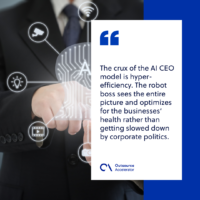The AI Boss
Having a bot as company chief may not be such a bad idea. AI is the ultimate rational thinker, and corporate decisions could be more precise and not spoiled by human bias. Critically, AI can process vast amounts of information and generate useful insights – the fundamental tasks of a Chief Executive Officer.
The crux of the AI CEO model is hyper-efficiency. The robot boss sees the entire picture and optimizes for the businesses’ health rather than getting slowed down by corporate politics. Communication silos that prevent departments from operating at a faster rate break down with an all-seeing AI boss.
Almost half of executives surveyed by EdX believe that “most” or “all” of the chief executive role should be completely automated or replaced by A.I.
AI ‘boss’ in real life
But surveys don’t always align with reality. Rum producer Dictador appointed a bot named Mika as CEO, which experts interpreted as an outlandish marketing gimmick rather than a true attempt at post-modern leadership.
Rum production is a laborious enterprise with plenty of logistical and managerial challenges. AI cannot coordinate different functions such as manufacturing, sales, dealerships, and marketing simultaneously. AI is not yet sophisticated enough to make such critical decisions.
If there’s a field where the AI CEO could be successful, it might be consumer software. Instagram only had 13 employees when Facebook bought it for $1 billion in 2012. Meanwhile, dating website Plenty of Fish generated $10 million in profits while being run by one employee—its founder, Markus Frind.
In the consumer software segment, the foundations of a product can be constructed once. When it goes live, the remaining work will be luring new users.
An ultra-smart AI system – which can predict market demand more efficiently and accurately than humans – can command and guide its human employees on what code to write or marketing spiel to create to align with the latest trends.
The human contribution
But do CEOs merely give directives to their employees? Cost-cutting and efficiency are important, but advocates of the AI CEO model confuse management with leadership. Management involves communication, organization, and streamlining operations – tasks that are being automated now, even when AI is in its nascent stages.
Meanwhile, true leadership does not involve repetitive and predictable tasks. A good CEO makes several high-value decisions daily, some of which are based on incomplete information and involve risk.
The success of a business depends on a CEO’s ability to maneuver through intricate layers of human interaction. To move the business forward, a good CEO establishes relationships with its stakeholders up and around the company while building a culture of accountability and professionalism.
Bots will displace jobs with simple repetitive tasks—this is for certain. But the business journey isn’t a static adventure. It has become more complicated now that we’re deep in the technology age.
A dynamic ecosystem requires a leader who understands the complexities of human behavior and computers’ potential. At this point, the human CEO is the most qualified individual.
The question for your business
Are you managing or leading your employees?




 Independent
Independent





















